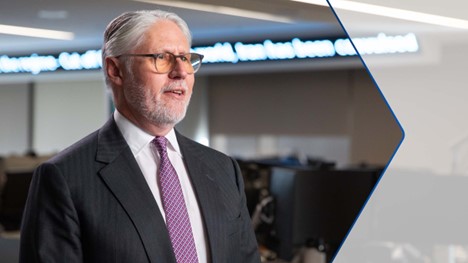The week that was …
Economic round-up
UK economic growth
The cyber attack at Jaguar Land Rover helped slow UK GDP growth to just 0.1% in the third quarter of 2025. The economy contracted slightly in September meanwhile yet, had car production merely remained flat, overall GDP would have grown 0.1% over the month, rather than shrinking 0.1%. Read more from the BBC here
UK employment data
The UK’s unemployment rate rose to 5% for the three months to September – above the 4.9% projected by analysts. Average wage growth was 4.6% over the same period – down from 4.7% over the three months to August. Read more from the BBC here
German investor sentiment
Germany’s benchmark of investor morale, the ZEW index, unexpectedly fell in November – dropping to 38.5 points from 39.3 points the month before. Analysts polled by Reuters had pointed to a reading of 41. Read more from Reuters here
China industrial production
China’s economic indicators continue to decline, with the country’s factory output and retail sales growing at their weakest pace in over a year in October, thereby putting pressure on policymakers to stimulate the economy. Industrial output grew 4.9% year-on-year in October – the weakest annual pace since August 2024. Read more from Reuters here
Gilts yields rise on Budget speculation
UK government bond yields rose after Rachel Reeves ditched plans to raise income tax in the Budget. The Treasury said a planned increase in tax rates had been pulled because of positive fiscal forecasts from the OBR, which reduced the government’s ‘black hole’ from £30bn to £20bn. Read more from the FT here
Markets round-up
Hedge funds reduce Mag7 exposure
Wall Street’s largest hedge funds cut their exposure to the ‘Magnificent Seven’ stocks in the quarter to September, diversifying into application software, e-commerce and payments companies. They also reduced exposure to healthcare and energy. Read more from Reuters here
Volatility in UK assets
UK government bond prices, as well as sterling, were volatile in early trade on Tuesday, as investors became increasingly unsettled over the recent unemployment data and uncertainty ahead of the Budget. Read more from CNBC here
China central bank buying supports gold
China’s unreported gold purchases could be more than 10x those of official figures, as analysts seek to explain the opaque sources of demand behind its recent rally. Publicly-reported buying by China’s central bank has been low but Société Générale estimates China’s total purchases could reach as much as 250 tonnes this year, based on trade data. Read more from the FT here
Oracle takes hit from AI exposure The market has become increasingly concerned about Oracle’s vast borrowing to fund a pivot to artificial intelligence, with its share price falling more than other tech peers. The US software group is planning to spend hundreds of billions of dollars on chips and data-centres over the next few years. Read more from the FT here
“We can see a situation further down the line where lending to the US or UK government for the long-term is riskier than lending to certain corporates. We have no evidence to give us confidence to the contrary.
Selected equity and bond markets: 07/11/25 to 14/11/25
| Market | 07/11/25 (Close) |
14/11/25 (Close) |
Gain/loss |
|---|---|---|---|
| FTSE All-Share | 5212 | 5221 | +0.2% |
| S&P500 | 6729 | 6734 | +0.1% |
| MSCI World | 4325 | 4344 | -0.4% |
| CNBC Magnificent Seven | 415 | 410 | -1.1% |
| US 10-year treasury (yield) | 4.10% | 4.14% | |
| UK 10-year gilt (yield) | 4.47% | 4.58% |
Investment round-up
Retirement age reaches record high
The average age at which men and women stopped working was around 66 years and 65 years respectively – the highest on record, according to the Office of National Statistics. The number of 65-year-olds who are ‘economically inactive’ has also fallen over the past decade – from 72% in 2015 to 56% this year.
Invesco and Franklin Templeton trusts to merge
The board of Invesco Global Equity Income trust has reached an agreement to merge with Franklin Global following consultation with shareholders. The Invesco trust would expand to up to £445m of net assets, depending on how many shareholders opt for cash.
Smith supports Smithson rollover
Terry Smith, CEO of the management group of the Smithson investment trust, says activist investor Saba Capital Management was “right” to push for a rollover given the persistent discount. The investment trust will now convert to an open-ended fund.
Dimensional’s active ETFs list in Europe
Two of Dimensional’s active UCITS exchange traded funds have listed in Europe – the Global Core Equity UCITS ETF and the Global Targeted Value UCITS ETF are listed in sterling and US dollars in London, and in euros in Frankfurt.
Annuity sales hit peak
Pension annuity sales increased by 24% last year to reach a 10-year peak of 89,600, according to the Association of British Insurers. The figure is a post-pension freedoms record for annuities. Annuity rates reached 7.65% in September, according to Standard Life.
… and the week that will be
Markets look to Nvidia for lead
The recent turbulence in technology stocks could either be heightened or quelled by the quarterly earnings report die from Nvidia this week. The company is at the heart of Wall Street’s artificial intelligence trade and a bellwether for AI spending. The technology sector had started to stabilise by the end of last week, but remains fragile. Read more from Reuters here
COP… continued
The 30th annual United Nations climate change conference (COP30) draws to a close this week, with the outcome still unclear. Taking place in the Brazilian city of Belem, the event has attracted 50,000 people from more than 190 countries around the world – though, importantly, not from the US, which has put up a major barrier to progress. Read more from Al Jazeera here
The week in numbers
UK inflation: Consensus forecasts for inflation in October have UK prices rising 3.7% year-on-year and 0.5% month-on-month, compared with 3.8% and 0% respectively the previous month.
UK retail sales: Consensus expectations for UK retail sales in October have them rising 1.6% year-on-year, up from 1.5% the previous month, and falling 0.2% month-on-month.
US employment: Initial jobless claims numbers in the US – for the week ending 15 November – could be published for the first time in weeks now the government shutdown is over.
US manufacturing: Consensus expectations are for the November reading of the US NY Empire State manufacturing index to fall to 7.
Eurozone consumer confidence: The index rose to -14.2 in October – up from -14.9 in September and its highest level in eight months.
German manufacturing: Consensus expectations are that the flash reading of the November purchasing managers index will rise to 50.4 – back in expansion territory – from 49.6 the previous month.
Japan inflation: Consensus forecasts have prices in Japan rising 3.1% over October – up from 2.9% in September.
In focus: Dicing with debt
Fixed income markets may have delivered some shocks in recent years but there have always been certain constants – not least that corporate bonds trade at a higher spread than their government peers. Last month, however, Microsoft’s corporate bonds briefly traded at a lower yield than US treasuries, begging the question, At a time of burgeoning government debt and erratic policymaking, should investors be steeling themselves for another new fixed income phenomenon in the year ahead?
In theory, of course, government bonds should always trade at a lower yield than corporate bonds. Given governments can print their own money, control their own currencies and raise taxes, their debt should have little chance of default. Investors have, however, started to reappraise the relative risks of corporate and government balance sheets – and bond markets have started to price in an alternative scenario, with credit spreads dropping to new lows.
For plenty of investors, these low and declining spreads are a sign to avoid the credit market. “There’s very little margin of error here,” points out David Coombs, multi-asset manager at Rathbones.
“Is it because many companies seem to have better balance sheets than governments? Or is it because investors are pushing bond prices ever higher as they try to lock in yields before expected rate cuts? We prefer to hold shares rather than equity-like fixed income – especially those with high cashflow and little debt.”
Fidelity Strategic Bond fund manager Mike Riddell is also avoiding corporate debt, reasoning: “Credit spreads are so narrow that there is hardly any room for further tightening. If anything goes wrong in the world, spreads could widen significantly.”
For his part, Huw Davies, investment manager, fixed income, absolute return at Jupiter Asset Management, says: “Credit is, on a spread basis at least, very expensive indeed – in fact, the most expensive we have seen for a long period of time.
We are seeing an AI and global trade environment where there are a lot of risks and yet, at the moment, there seems very little risk priced in. Credit markets do look vulnerable.”
“One of the things that has supported credit markets is the absolute level of yield. That has maintained inflows – but, also, volatility has been very low and investors have been able to earn that carry. Still, it is plainly a risk to the market. We are seeing an AI and global trade environment where there are a lot of risks and yet, at the moment, there seems very little risk priced in. Credit markets do look vulnerable.”
Others, however, are quick to point out that, objectively, corporate debt appears to be a better option than government debt, with Alexander Pelteshki, portfolio manager, fixed income at Aegon Asset Management, noting: “There are fiscal pressures building across most of the major markets and they are unlikely to go away for obvious political reasons – politicians don’t get elected when they withdraw spending. As a result, we are much happier lending to corporate balance sheets than those of governments. We do not see governments reining in fiscal deficits, which are quite extraordinary.”
Pelteshki goes on to argue that, even with the extra revenues from tariffs, the US budget deficit is still 6% to 7% a year at a time when the economy is growing rapidly. “This is unprecedented,” he continues. “It is rare to see this large fiscal spending in non-recessionary environments. When we see spending patterns like these, it makes us nervous.”
He says he has more confidence lending to Apple for 30 years, than the US government for 30 years, adding: “We can see a situation further down the line where lending to the US or UK government for the long-term is riskier than lending to certain corporates. We have no evidence to give us confidence to the contrary.”
The problem is not necessarily that the US government defaults – more that markets demand an ever-higher yield, which pushes prices lower and makes treasuries a bad investment.
There are also technical arguments that support corporates over governments – for example, if governments are to sustain their current debt levels, bond markets will need to digest an increasingly enormous amount of debt. Businesses have more choice on how and when they issue debt and the likes of Microsoft have strong balance sheets and only need to issue debt strategically. This is likely to prevent a supply glut.
If a company replaces a worker with AI – and the economy can’t give that worker a job elsewhere – yes, the company will become more productive, but the economy won’t.”
The final consideration is one of trustworthiness. Continuing to use Microsoft as an example, it cannot act unilaterally – it is held to account by a board, by shareholders and by its customers. Yes – there should be similar checks and balances on the US economy, but they have proved increasingly ineffective in the face of the current administration. Recent challenges to Federal Reserve independence have given investors pause for thought.
Even so, arguments the other way remain – for example, if a government were to narrow the deficit, it would be good for its credit rating, but it could be bad for the economy and corporate debt. Plus it may choose to do this by taxing the corporate sector – though, of course, many companies issuing debt are global, mobile and generally not in thrall to the whimsy of a single government.
The influence of AI is also complicating investment considerations. As Mark Nash, investment manager, fixed income, absolute return at Jupiter Asset Management, says: “If a company replaces a worker with AI – and the economy can’t give that worker a job elsewhere – yes, the company will become more productive, but the economy won’t. The economy’s outlook won’t get better unless you can rehome that worker in another job.”
If Trump manages to boost the manufacturing sector, that is where the workers may go but it will take time and there is little evidence for it yet. In the meantime, those jobless workers will put more pressure on government balance sheets.
Nevertheless, reckons Nash, there is still an argument that falling rates will boost government bonds over corporates. “Policy rates are important at the front end,” he argues. “As the all-in rates come down as they cut rates, credit is going to get more volatile because it loses that support. But fiscal risk will also start to subside. So sovereign bonds could begin to outperform versus credit.”
For the time being, the idea corporate bonds should trade at a lower yield than government bonds is an interesting enough thought experiment – but one that offers relatively few examples in practice. That said, it has been commonplace in emerging economies where trust in government policymaking has tended to be lower – and it is not impossible it could start to happen at the margins in developed markets.

In focus: Numbers v sentiment
Foreign purchases of Chinese equities have hit their highest level in four years. Offshore inflows into Chinese equities are $50.6bn (£38.4bn) over the year to date – almost five times their level in 2024, according to data from the Institute of International Finance. Yet, recent economic data from the country shows a sharp loss of momentum, which may derail investor sentiment.
Investors have chased the revival in Chinese equities in 2025 after years of dismal returns. The launch of DeepSeek back in January has driven inflows as investors look for cheaper options to play the artificial intelligence story. The Shanghai Composite index is up 18.5% for the year, while the Hang Seng is up 31.5%.
The economic story is, however, starting to deteriorate. Last week, for example, official data showed industrial production growth in October slowing to its weakest pace since August 2024. Retail sales expanded 2.9% over the same period – also their worst pace since August last year. Exports have sustained economic growth, but these also weakened significantly in October as the impact of front-loading to avoid tariffs started to come out of the system.
This weakening outlook may not matter very much to investors. After all, valuations in the Chinese market still look cheap and still leave some margin for error. It is also possible the Chinese government will stimulate the economy now that a resolution to the tariff problem appears to be in prospect.
“The trade agreement reached between the US and China in late October was encouraging – mainly because it signalled dialogue between the world’s two largest economies,” says Andrew Mattock, a portfolio manager at Matthews Asia. “If the agreement is upheld, China will be subject to tariffs of approximately 47%, and the US will have less restricted access to China’s rare earth minerals.”
Geopolitics remains “a wild card”, Mattock adds, and is thus unlikely to be a meaningful or sustainable driver of returns. “In our view, a recovery in the property market remains the single most important factor in supporting China’s economic expansion,” he says. “There are signs of stabilisation and progress.”
Perhaps most importantly, corporate earnings have remained encouraging across many sectors. There are exceptions – notably consumer staples, consumer discretionary and real estate – but China has always been a market that requires discernment.
Nevertheless, Mattock concludes: “We see significant value in China’s equity market and anticipate continued strong performance in financials, materials and industrials and in supply chains for exports sectors. The Chinese equity landscape also features modern, innovative companies – including digital platforms and e-commerce leaders and companies in the AI infrastructure and biotech space.”
Ultimately – as things stand – this appears to matter more to investors than weakening growth.










